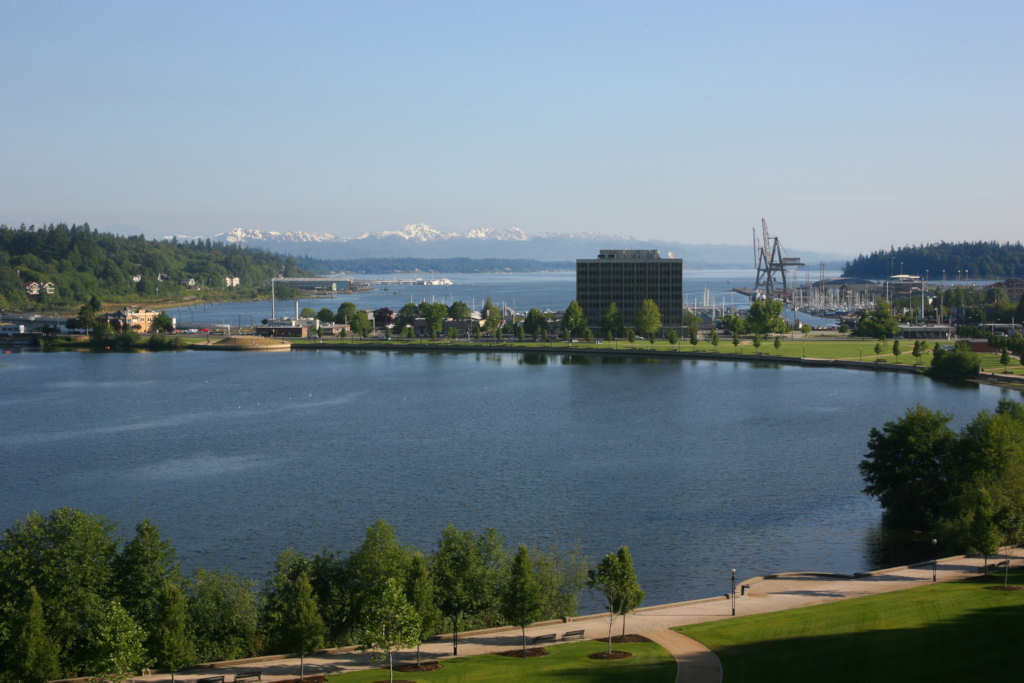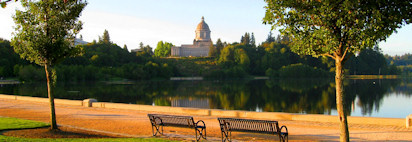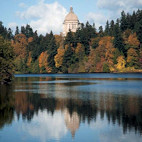Introduction - CLIPA White Paper (part 1)
Preserving Capitol Lake - A White Paper with Recommendations
The CLIPA Science & Policy Panel has created a realistic, science based and practical plan to improve water quality and sediment management in the Deschutes Watershed while preserving one of our state's precious icons, Capitol Lake.
We hope you will read this body of work carefully, as we believe we have addressed environmental, aesthetic, social, economic and fiscal responsibilities in a balanced manner to the benefit of the public.
The Core of the Plan - Dredging
Introduction Letter
Dear Friends of Capitol Lake:
Last summer, our community was stunned by the CLAMP Steering Committee’s split vote favoring removal of the dam which creates Capitol Lake. This action would result in reverting the Capitol Lake area back to a tidal mud flat, irretrievably losing Capitol Lake and all that it provides to the citizens, businesses, and community. Almost as startling, the CLAMP study focused on Capitol Lake to the exclusion of the Deschutes Watershed as a whole, missing the opportunity to identify and address water quality and sediment management concerns through more viable, long-term and cost-effective solutions.
In response, a group of concerned citizens, most with strong environmental interests and credentials, formed the non-profit organization “Capitol Lake Improvement and Protection Association” (CLIPA) in order to study the issue and identify more appropriate alternative solutions which would provide for improved water quality and sediment management in the Deschutes Watershed, including Capitol Lake basin and Budd Inlet, while preserving one of our state’s most precious icons, Capitol Lake.
This committed grassroots group has worked steadily, creating a strong Science and Policy Panel and challenged the Panel members to create a realistic, scientifically-based and practical plan which would accomplish the above goals. This packet contains the results of those exhaustive efforts. You will note that in addition to our stated position, we provide many options and alternatives. A solution must embrace the many interests in support of aesthetics and ecosystem health, as well as economic vitality and social needs, and be flexible to findings from continued research.
Jack Havens
Chair - Capitol Lake Improvement and Protection Association - CLIPA
Board Members
- Jack Havens, Chair
- Jay Allen, Membership
- Jewel Goddard, Treasurer
- Bob Barnes
- John DeMeyer
- Les Eldridge
- Brenda Hood
- Jim Lengenfelder
- Allen Miller
- Ron Rants
- Robert Utter
- Bob Wubbena
Science and Policy Panel Subject Matter Experts (July 2010)
- Bob Barnes - Public Events Planning
- Harvey Childs - Fiscal Budget and Public Administration
- Denis Curry - Organizational Management and Economics
- Curtis Dahlgren - Fisheries and Environmental Permitting
- John DeMeyer - Forestry and Aquatic Land Management
- Les Eldridge - Water Quality and Shoreline Policy
- Jack Havens - Wildlife / Aquatic Information Coordination
- Brenda Hood - Policy Analysis, Public Administration and Research
- Marc Horton - Water Quality, Permitting, and Environmental Policy
- Eric Hurlburt - Shellfish, Aquaculture and Economic Development
- Norman Johnston - Architectural Historian of State Capitol Campus Design
- Gary Larson - General Administration History and Capitol Lake Management
- Jim Lengenfelder - Social Science and Economics
- Allen Miller - Heritage Park Development / Capitol Campus Design and Development
- Ron Rants - Community Development
- Oscar Soule - Environmental Policy and Science
- Robert Utter - Environmental Law
- Bob Van Schoorl - Port Operations
- Bob Wubbena - Watershed Management and Marina Operations
Introduction - CLIPA White Paper
by: CLIPA Capitol Lake Improvement & Protection Assn.The Clipa White Paper is a realistic & science based plan to improve water quality and sediment management in the Deschutes Watershed and Capitol Lake, Olympia, Washington.


